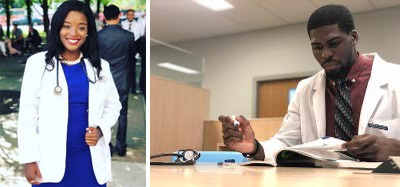College of Medicine
BRIDGES Program
According to the US Census Bureau, by the year 2050, minorities will make up about
53% of the population. However, while the underrepresented ethnic groups of today
will soon become tomorrow’s majority, they will remain underrepresented within the
physician workforce unless strategic efforts towards diversity are made to keep pace
with that of the population.

From left to right, BRIDGES students - College of Medicine class of 2022:
Jose Sinon, David Mandil, Takisha Morancy, Marioghae Otuada, Chinelo DeBrady, Michael
Huaman
As a direct response to this impending reality, I developed the BRIDGES to Medicine Program (BRIDGES)—designed to provide a new access point into medicine for students from minority
groups and low socioeconomic backgrounds seeking admission into our College of Medicine.
The program is structured to allow participating BRIDGES students opportunities to
take some of the same courses, in a co-mingled setting, as first-year College of Medicine
students. Students are also provided a monthly stipend and housing to offset any hardships
that may impede their achievement in the program. Upon successful completion, students
are granted admission into Downstate’s College of Medicine as first-year students.
To date, the BRIDGES Program has exceeded expectations and the performance of participating
students has proven that this pilot is highly effective. Of the 16 students from the
inaugural BRIDGES cohort, 14 successfully matriculated into the College of Medicine
at SUNY Downstate. An astounding 88% success rate with the first gifted group of students.

When speaking to a few BRIDGES Alumni who moved on to become students in the College
of Medicine about why they chose to be in the program, here’s what was shared:
“While I am on this planet, I want to make my contribution, so for me, being a physician
was the ultimate way of being of service to others. BRIDGES was an invaluable experience
that gave me the confidence necessary to approach medical school. The time management
and studying skills provided were priceless. I also wouldn’t trade the connections
that I built with my BRIDGES family that year for anything. We look out for each other
and check up on each other. Our bond is cemented, we are a family.”
—Chinelo DeBrady, second-year medical student
“I was starting to feel like maybe I didn't belong in the Medical field. If all these
admission boards are telling me I don’t belong, maybe they’re right—so, I decided
to get a job helping people get on Medicaid. Then I received a call from the Associate
Dean of the Office of Diversity Education and Research who told me about BRIDGES and
asked if I was interested. I cried tears of joy knowing that there was someone out
there who looked at my application and thought that I belonged. This was everything
I prayed for – a chance. Someone to tell me that all those other people were wrong!
That I did belong!”
—David Mandil, second-year medical student
"We know what it was like going through the program and we wanted to be a resource
to new students coming into BRIDGES. It was really important for us as alum of the
program to develop a mentorship opportunity for the new class as a way to expand our
relationships beyond our BRIDGES cohort-- and to let them know, we've been there,
we did it... and you can, too."
—Marioghae Otuada, second-year medical student
Across the board, students in the program have been a tremendous asset to the Downstate
community. Some have been recipients of prestigious awards and accolades, like Jose Sinon, a second-year student who was recently chosen as one of the recipients of the National Medical Fellowships’ 2019 Dr. David Kearney McDonough Scholarship. While others have gone on to be stewards in the community, like Takisha Morancy, a current second-year student who developed a medical school shadowing program for
local high school students called “A Day in the Life,” and Michael Huaman, who is the co-President of the Latino Medical Student Association and working to
raise awareness about health disparities that impact Latino communities.
I’d like to extend my gratitude to all the faculty and staff who have contributed
to the success of BRIDGES, including Jeffrey Putman, Ed.D. in the Office of Student and Academic Affairs; Jeanne Macrae, M.D., Schnell Lafortune in the College of Medicine’s Office of Academic Affairs; Shemeika Bowman, Anika Daniels-Osaze, Ed.D., Carla Boutin-Foster, M.D., MS, Tina Adjei-Bosompem, and Runako Gulstone in the Office of Diversity Education and Research; Dr. Shushawna DeOliveira, Ph.D., Anthony Joseph, M.D., Lorraine Terracina, P.hD., and Dr. Marcia Gerber, M.D., in the Office of Admissions; and Seth Langley,Ph.D., Cheryl Corn, Gerard Robertson, and Susan Kane in the Office of Academic Support Services and Advisement.
|